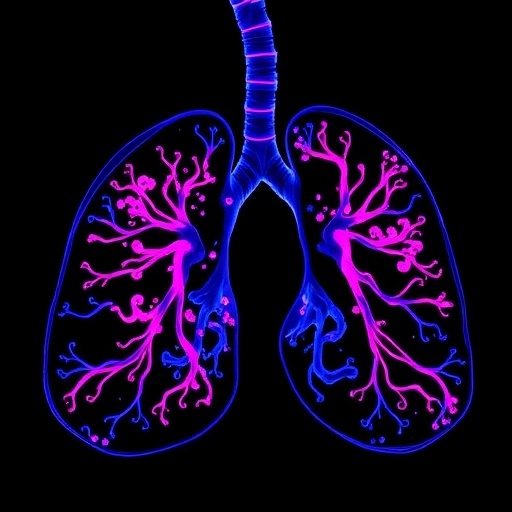In a groundbreaking study poised to reshape our understanding of lung cancer biology, researchers have uncovered a pivotal role for the enzyme HACD3 in driving the malignant progression of non-small cell lung cancer (NSCLC) through suppression of a critical intracellular signaling pathway. This discovery shines a light on novel molecular interactions that bypass traditional metabolic functions, revealing fresh therapeutic targets for one of the world’s deadliest cancers.
Fatty acid metabolism has long been implicated in cancer biology, with enzymes involved in lipid synthesis often hijacked to fuel aggressive tumor growth. However, the enzyme 3-hydroxyacyl-CoA dehydratase 3 (HACD3), a member of the very long-chain fatty acid dehydratase family, exhibits relatively mild enzymatic dehydratase activity, prompting scientists to explore whether its role in cancer extends beyond canonical metabolic pathways. The new research reveals that HACD3 is more than just a metabolic player; it acts as a sophisticated molecular regulator that promotes tumor malignancy by modulating critical signaling pathways.
Investigations demonstrated that HACD3 is significantly overexpressed at both the mRNA and protein levels in NSCLC tissues and cell lines. This heightened expression correlates with aggressive phenotypes, including increased cellular proliferation and enhanced migratory capacity in vitro, as well as accelerated tumor growth when NSCLC cells are implanted in immunocompromised mice. These functional assays provide compelling evidence that HACD3 is not a mere bystander but an active facilitator of lung cancer progression.
Intriguingly, the researchers went beyond correlation by deploying a genetic knockout strategy. By engineering mice completely deficient in Hacd3, they created a robust model to investigate the enzyme’s role in vivo. These knockout animals, when subjected to the carcinogen urethane known to induce lung tumors, showed a striking reduction in tumor burden compared to wild-type controls. Fascinatingly, this tumor suppression effect occurred without significant changes in overall fatty acid composition, indicating that HACD3’s pro-tumorigenic influence operates independently of its classic enzymatic function in fatty acid metabolism.
Delving deeper into the molecular mechanisms, the study employed transcriptomic analyses paired with co-immunoprecipitation to identify proteins that physically interact with HACD3. They discovered direct binding between HACD3 and components of the mitogen-activated protein kinase (MAPK) pathway, specifically the kinases MKK7 and MAPK10 (also known as JNK3). This interaction appears to effectively suppress MAPK signaling, a pathway traditionally known for its tumor-suppressive effects via regulation of cellular stress responses and apoptosis.
HACD3’s binding to MKK7 and MAPK10 hinders their ability to propagate anti-tumorigenic signals, thus tipping the balance in favor of malignant cell survival and proliferation. Strikingly, the core pro-oncogenic activity of HACD3 was mapped to a discrete C-terminal domain spanning amino acid residues 231 to 259. This region mediates the protein-protein interactions necessary for suppressing MAPK pathway activity, uncoupling HACD3’s oncogenic role from its enzymatic domain.
The implications of these insights extend well beyond basic biology. Targeting the HACD3-MKK7-MAPK10 axis with therapeutic agents—such as small molecule inhibitors or peptides designed to disrupt these protein interactions—could unleash the suppressed MAPK signaling cascade, potentially restoring cancer cell sensitivity to apoptosis and halting tumor progression. This mechanism represents a sharp departure from classical approaches aimed solely at interfering with metabolic enzymes’ catalytic functions.
Moreover, the study highlights the versatility of metabolic enzymes, which can moonlight as crucial regulators in complex signaling networks governing tumor biology. HACD3 is emblematic of such multifunctionality, challenging the field to consider how other metabolic enzymes might similarly influence cancer by non-catalytic means. This paradigm shift could uncover an array of previously unappreciated molecular vulnerabilities in cancer cells.
NSCLC remains a formidable clinical challenge due to its heterogeneity and frequent resistance to existing therapies. The identification of HACD3 as a pro-tumorigenic factor offers a novel target that might circumvent some resistance mechanisms associated with the MAPK signaling pathway. Since HACD3’s role is independent of its enzymatic function, drugs designed to disrupt its protein-protein interactions may avoid compensatory metabolic adaptations, potentially improving therapeutic efficacy.
The research was comprehensive, leveraging bioinformatics databases such as GEPIA and the Human Protein Atlas to analyze HACD3 expression patterns, and deploying cutting-edge molecular biology techniques, including the generation of truncated plasmids and synthetic peptides, to functionally dissect the domains responsible for tumorigenic interactions. Additionally, cutting-edge lipidomic profiling via gas chromatography–mass spectrometry confirmed the mechanistic independence from fatty acid metabolic alterations.
As the study demonstrates, cancer progression is often driven by a complex interplay between metabolism and intracellular signaling. The discovery that HACD3 acts primarily through suppression of a tumor-inhibitory MAPK signaling axis—not through modification of lipid metabolism—provides a fresh lens through which to interpret tumor biology and drug resistance.
The field now faces a tantalizing challenge: to develop and test agents that can selectively disrupt HACD3’s pro-oncogenic domain or block its interaction with MKK7 and MAPK10. Such therapeutic strategies might be particularly valuable for patients with NSCLC exhibiting high HACD3 expression, providing a biomarker-driven approach to personalized cancer treatment.
In conclusion, this landmark study elucidates a previously unrecognized tumor-promoting role for HACD3 in lung cancer. By suppressing the MKK7/MAPK10 signaling axis, HACD3 enables cancer cells to bypass critical growth restraints, promoting malignant progression. These findings not only deepen our grasp of NSCLC pathobiology but also unveil new avenues for innovative therapeutic interventions aimed at improving patient outcomes in a cancer type that continues to exact a heavy toll globally.
Subject of Research: Non-Small Cell Lung Cancer (NSCLC) and the molecular role of HACD3 in tumor progression
Article Title: HACD3 promotes malignant progression of NSCLC by suppressing the MKK7/MAPK10 signaling axis
Article References:
Wang, X., Liang, H., Du, Q. et al. HACD3 promotes malignant progression of NSCLC by suppressing the MKK7/MAPK10 signaling axis. BMC Cancer 25, 1317 (2025). https://doi.org/10.1186/s12885-025-14621-y
Image Credits: Scienmag.com




